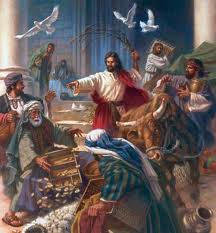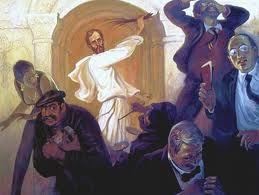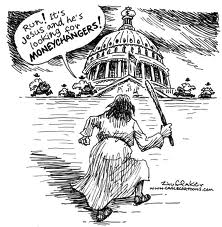Jesus and the Bankers
 Tuesday, July 24, 2012 at 5:00AM
Tuesday, July 24, 2012 at 5:00AM  I mentioned Saturday one group of people that Jesus was displeased with—the religious bureaucratic hypocrites. But there is another group he was not too happy with. Matthew 21 tells us of one time that Jesus was in the temple. This is from the translation The Message:
I mentioned Saturday one group of people that Jesus was displeased with—the religious bureaucratic hypocrites. But there is another group he was not too happy with. Matthew 21 tells us of one time that Jesus was in the temple. This is from the translation The Message:
12-14Jesus went straight to the Temple and threw out everyone who had set up shop, buying and selling. He kicked over the tables of loan sharks and the stalls of dove merchants. He quoted this text:
My house was designated a house of prayer;
You have made it a hangout for thieves.
Now there was room for the blind and crippled to get in. They came to Jesus and he healed them.
15-16When the religious leaders saw the outrageous things he was doing, and heard all the children running and shouting through the Temple, "Hosanna to David's Son!" they were up in arms and took him to task. "Do you hear what these children are saying?"
Jesus said, "Yes, I hear them. And haven't you read in God's Word, 'From the mouths of children and babies I'll furnish a place of praise'?"
17Fed up, Jesus turned on his heel and left the city for Bethany, where he spent the night.
In this case Jesus made the religious leaders, the religious bureaucracy, upset. Why were they upset besides the obvious fact that their offices were in question by the popularity of Jesus?
There were several rules designed to implement the principle that when one offered a sacrifice, the animal should be without blemish. So you would select one of the better animals of your flock to sacrifice. The priest would then examine the animal to determine if it was suitable.
 For some reason, in the time frame we are talking about here, the second temple period, the animal was usually “not good enough.” That meant if you wanted to offer a sacrifice you had to then purchase another animal. Naturally, right there was the solution! You could sell your lamb and buy a dove, right there in the temple. How convenient! The religious leaders really cared for their "flock."
For some reason, in the time frame we are talking about here, the second temple period, the animal was usually “not good enough.” That meant if you wanted to offer a sacrifice you had to then purchase another animal. Naturally, right there was the solution! You could sell your lamb and buy a dove, right there in the temple. How convenient! The religious leaders really cared for their "flock."
Not exactly. Since there was limited space at the temple, who do you think got the space to sell the doves? The answer is, whoever gave the biggest bribe to the religious leaders. Of course this meant that an approved animal was a lot more expensive than it should have been. The public was being ripped off by their leadership. As Jesus noted, they were thieves.
While I like the translation in The Message, I feel that the term “loan sharks” might be misleading. I am sure The Message wanted it to be clear that they were crooks, but no loans were taking place. What was happening was that if you wanted to make a contribution of coins toward the temple you could not use the normal coins of the time. They were “dirty.” You had to use special coins from Judah's past. So you would go to the "loan sharks," the money changers, and exchange money. Naturally the cost of the special coins was greater than the value of the normal coin in precious metals. So this increased the cost of making an offering. Naturally, as the temple bureaucracy had no need for the special money, they would sell it back to the money changers, and so the process continued with each side getting their cut from the faithful. As Jesus noted, they were thieves.
 Jesus was not happy with these bankers, as they were crooks.
Jesus was not happy with these bankers, as they were crooks.
I do want to make one thing clear. There is nothing wrong with the supposed banking model. (I say supposed as the traditional banking model is not used by the big banks.) A well-run bank is designed to be an intermediary between savers and borrowers. I have known, and continue to know, reputable bankers. But our large money center banks have long abandoned that model. They live only to plunder. They fix rates. They sell securities they know are trash. Then they retire to warmer climates. Yes, they may very well be headed for a very warm climate.
So there are two categories of people Jesus has been known to get angry at—the religious bureaucrat and the crooked banker. I do not think I would want to work for the Vatican Bank!
Here is one cinematic interpreation:




